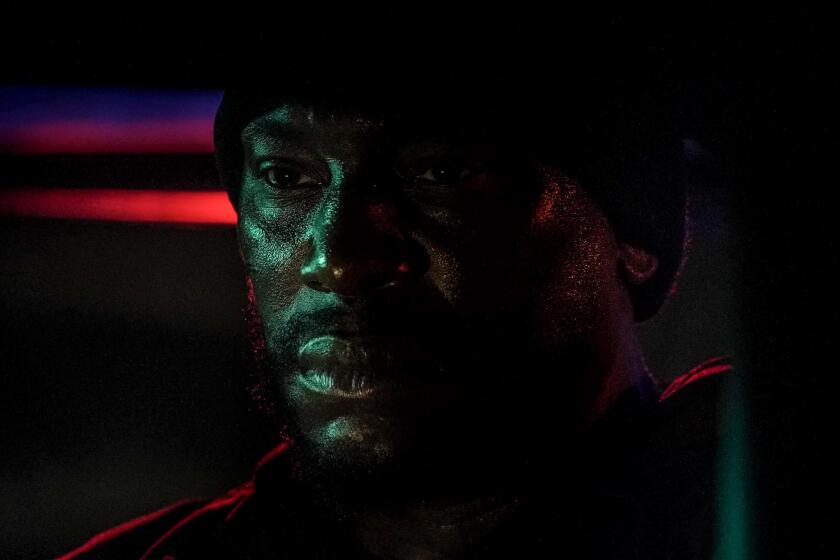Where repression isn’t candy-coated
“Caramel” opens with a shot of a torrent of the sticky stuff, a vista that plays like a rising tide of unalloyed sweetness to domestic viewers. But in Lebanon’s Beirut, where this effortlessly empathetic film is set, caramel means something else as well: It’s used as a depilatory in beauty salons, inflicting pain rather than causing pleasure.
Co-written and directed by its star, Nadine Labaki, and a highlight of the Directors’ Fortnight section at the Cannes Film Festival, “Caramel” practices a similar deception. It is sweet but not saccharine, an intimate film that doesn’t stint on the desperation and anxiety that go along with the search for love.
Largely set, like the fine French “Venus Beauty Institute,” within the walls of a neighborhood beauty salon, “Caramel” investigates the complications and contradictions of the romantic lives of five women who either work or hang out at one particular establishment. Using largely nonprofessional actors, the film casually submerges us in a world at once like our own and removed from it.
Called “Si Belle,” the salon, as witnessed by the lopsided “B” in its sign, has seen spiffier days. But for the women whose lives center around it, the salon creates a community that sustains them when all else fails, a family that gives them strength in situations where confiding in their real family would be out of the question.
Labaki has dedicated this film “to my Beirut,” and she is clearly enamored of this very complicated city, divided not only between Christian and Muslim neighborhoods but also between the forces of tradition and modernity, between a desire to do as you please and a fear of going too far and offending unbending norms.
When we first meet Layale (Labaki), the salon’s thirtysomething owner, she seems to be in complete charge of her life, keeping her customers happy, ignoring parking tickets and able to leave things at a moment’s notice to run off to clandestine assignations with a man we never see.
Things are not quite this simple. The unseen man turns out to be very much married and Layale, apparently like many unmarried women in Beirut, not only still lives at home with her parents, she shares a bedroom with her younger brother. There is more desperation about Layale than we realize at first, making it unfortunate that she doesn’t recognize that the handsome policeman who keeps giving her tickets finds her attractive.
Layale is Christian, but her closest co-worker, Nisrine (Yasmine Al Masri), is a Shiite Muslim. Coming from a background so traditional she has to practically change clothes when she goes home, she lives in a neighborhood where sitting in a car and talking to a man is grounds for being rousted by the police for “indecent activity.” Engaged to be married to a fellow Muslim, Nisrine has a personal dilemma she fears may cloud her wedding.
Regular visitors to the salon include Jamale (Gisele Aouad), a middle-aged actress who fears aging, and Aunt Rose (Siham Haddad), a sweet-natured seamstress who’s sacrificed her life to take care of Lili (Aziza Semaan), an older sister who is deteriorating mentally.
It is Rima (Joanna Moukarzel), however, who has the trickiest dilemma, and one that the film handles with quiet delicacy. Though no one alludes to it with so much as a word, it is clear that Rima has the burden of being attracted to women in a society that doesn’t allow for that. And then one day . . .
Though it has superficial resemblances to Hollywood product, “Caramel” has the tact and sophistication not to tie things up too tidily for any of its women. Possibilities appear for some but not all of them, and it is not at all a sure thing that any of those possibilities will pan out. All these characters can count on, finally, is that they will be there for one another. The bonds between women, “Caramel” says, are the ones that matter, the ones that last.
--
--
“Caramel.” MPAA rating: PG for thematic elements involving sexuality, language and some smoking. Running time: 1 hour, 36 minutes. In Arabic and French with English subtitles. In limited release.
More to Read
Only good movies
Get the Indie Focus newsletter, Mark Olsen's weekly guide to the world of cinema.
You may occasionally receive promotional content from the Los Angeles Times.











